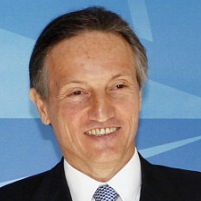Ambassador from Italy: Who Is Claudio Bisogniero?
Monday, February 06, 2012

Claudio Bisogniero, who has been posted to the U.S. on two previous occasions, officially took the reins as Italy’s ambassador to the U.S. on February 6, just in time to coordinate the visit to Washington of Italian Prime Minister Mario Monti, who will arrive on February 9. The previous ambassador, Giulio Terzi, was called back to Italy to serve as foreign minister after the forced resignation of the nation’s controversial prime minister, Silvio Berlusconi.
Born in Rome on July 2, 1954, Claudio Bisogniero earned a degree in Political Science from the University of Rome in 1976, and served as an officer in the Italian Army in 1976 and 1977. He then entered the Italian Foreign Service in May 1978. For his first overseas posting, Bisogniero served as first secretary for economic and commercial affairs at the Italian embassy in Beijing, China, from September 1981 to 1984.
From 1984 to 1989 he served at the Permanent Mission of Italy to NATO in Brussels, Belgium, where he focused on disarmament issues and also served as a delegate to the Senior Political Committee. Returning to Rome in 1989, Bisogniero joined the Office of the Diplomatic Adviser to the President of the Republic, where he remained until 1992. There he dealt with international issues relevant to Italian President Francesco Cossiga.
In late 1992 Bisogniero was posted for the first time to the U.S., to serve as first counselor for economic and commercial affairs at the embassy in Washington, D.C., with special focus on financial issues, the IMF and World Bank, and defense industry co-operation. After four years in Washington, he moved 225 miles north to serve at the Permanent Mission of Italy to the United Nations in New York, with primary responsibilities for political affairs and UN reform. Bisogniero served there from 1996 to 1999, when he returned to Rome to serve at the Foreign Affairs Ministry for the next 8 years.
From 1999 to 2002, he served in the Personnel Department and later at the Office of the Secretary General, as direct collaborator with the Secretary General. In February 2002 Bisogniero was appointed deputy director general for political multilateral affairs, responsible for NATO, the United Nations, G8, disarmament, OSCE, anti-terrorism and human rights issues. In June 2005 he became director general for the Americas, with responsibility for the relations with the nations of the Western Hemisphere, including the U.S. In October 2007 Bisogniero was named NATO Deputy Secretary General, serving in Brussels until late 2011, when he was named ambassador to the U.S.
Bisogniero and his wife, Laura Denise, have a daughter and a son. His stated hobbies and personal interests include classical music, reading, sailing and flying. Since 2008, he has been a member of the Italy-USA Foundation, a non-profit organization based in Rome, Italy, established to promote friendship between Italians and Americans, as well as American culture in Italy.
-Matt Bewig
Claudio Bisogniero, the New Italian Ambassador to the United States (i-Italy)
- Top Stories
- Unusual News
- Where is the Money Going?
- Controversies
- U.S. and the World
- Appointments and Resignations
- Latest News
- Musk and Trump Fire Members of Congress
- Trump Calls for Violent Street Demonstrations Against Himself
- Trump Changes Name of Republican Party
- The 2024 Election By the Numbers
- Bashar al-Assad—The Fall of a Rabid AntiSemite






Comments